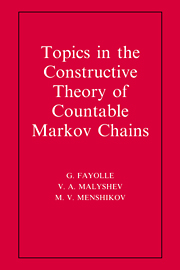Crossref Citations
This Book has been
cited by the following publications. This list is generated based on data provided by Crossref.
Botvich, Dimitri
Fayolle, Guy
and
Malyshev, Vadim
1994.
11th International Conference on Analysis and Optimization of Systems Discrete Event Systems.
Vol. 199,
Issue. ,
p.
463.
Korshunov, D. A.
1996.
Tightness and continuity of a family of invariant measures for Markov chains depending on a parameter.
Siberian Mathematical Journal,
Vol. 37,
Issue. 4,
p.
730.
Aspandiiarov, S.
Iasnogorodski, R.
and
Menshikov, M.
1996.
Passage-time moments for nonnegative stochastic processes and an application to reflected random walks in a quadrant.
The Annals of Probability,
Vol. 24,
Issue. 2,
Borovkov, K. A.
1996.
A bound for the distribution of a stopping time for a stochastic system.
Siberian Mathematical Journal,
Vol. 37,
Issue. 4,
p.
683.
Foss, Serguei
and
Last, Günter
1996.
Stability of polling systems with exhaustive service policies and state-dependent routing.
The Annals of Applied Probability,
Vol. 6,
Issue. 1,
Ethier, S. N.
1996.
A gambling system and a Markov chain.
The Annals of Applied Probability,
Vol. 6,
Issue. 4,
Bean, N. G.
Gibbens, R. J.
and
Zachary, S.
1997.
Dynamic and equilibrium behavior of controlled loss networks.
The Annals of Applied Probability,
Vol. 7,
Issue. 4,
Shih-Tsung Yang
and
Ephremides, A.
1997.
Optimal network design: the base station placement problem.
Vol. 3,
Issue. ,
p.
2381.
Малышев, Вадим Александрович
and
Malyshev, Vadim Aleksandrovich
1998.
Случайные грамматики.
Успехи математических наук,
Vol. 53,
Issue. 2,
p.
107.
Comets, Francis
Menshikov, Mikhail
and
Popov, Serguei
1998.
Lyapunov functions for random walks and strings in random environment.
The Annals of Probability,
Vol. 26,
Issue. 4,
Малышев, Вадим Александрович
and
Malyshev, Vadim Aleksandrovich
1999.
Вероятность вокруг квантовой гравитации: планарная гравитация.
Успехи математических наук,
Vol. 54,
Issue. 4,
p.
3.
De Veciana, G.
Tae-Jin Lee
and
Konstantopoulos, T.
1999.
Stability and performance analysis of networks supporting services with rate control-could the Internet be unstable?.
p.
802.
Alanyali, Murat
1999.
Three management policies for a resource with partition constraints.
Advances in Applied Probability,
Vol. 31,
Issue. 3,
p.
795.
Albers, Susanne
and
Mitzenmacher, Michael
2000.
Average-case analyses of first fit and random fit bin packing.
Random Structures and Algorithms,
Vol. 16,
Issue. 3,
p.
240.
He, Qi-Ming
2000.
Classification of Markov processes of M/G/1 type with a tree structure and its applications to queueing models.
Operations Research Letters,
Vol. 26,
Issue. 2,
p.
67.
Machado, F. P.
and
Popov, S. Yu.
2000.
One-dimensional branching random walks in a Markovian random environment.
Journal of Applied Probability,
Vol. 37,
Issue. 4,
p.
1157.
Zachary, Stan
2000.
Dynamics of large uncontrolled loss networks.
Journal of Applied Probability,
Vol. 37,
Issue. 3,
p.
685.
Al-Ammal, Hesham
Goldberg, Leslie Ann
and
MacKenzie, Phil
2000.
STACS 2000.
Vol. 1770,
Issue. ,
p.
169.
He, Qi-Ming
2000.
Classification of Markov Processes of Matrix M/G/l type with a Tree Structure and its Applications to the MMAP[K]/G[K]/1 Queues.
Communications in Statistics. Stochastic Models,
Vol. 16,
Issue. 5,
p.
407.
Goldberg, Leslie Ann
Jerrum, Mark
Kannan, Sampath
and
Paterson, Mike
2000.
Automata, Languages and Programming.
Vol. 1853,
Issue. ,
p.
705.





